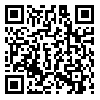Volume 24, Issue 2 (7-2018)
Back to this Issue |
Back to browse issues page
Download citation:
BibTeX | RIS | EndNote | Medlars | ProCite | Reference Manager | RefWorks
Send citation to:



BibTeX | RIS | EndNote | Medlars | ProCite | Reference Manager | RefWorks
Send citation to:
Dehvan F, Mokhtari Z, Aslani M, Ebtekar F, Ghanei Gheshlagh R. The prevalence of needlestick injury in students of medical sciences universities: A systematic review and meta-analysis
. Journal of Hayat 2018; 24 (2) :140-151
URL: http://hayat.tums.ac.ir/article-1-2322-en.html
URL: http://hayat.tums.ac.ir/article-1-2322-en.html
1- Dept. of Nursing, School of Nursing and Midwifery, Kurdistan University of Medical Sciences, Sanandaj, Iran
2- Dept. of Nursing, University of Social Welfare and Rehabilitation Sciences, Tehran, Iran
3- Shahid Beheshti Hospital of Hamadan, Hamadan University of Medical Sciences, Hamadan, Iran
4- Dept. of Midwifery, School of Nursing and Midwifery, Kurdistan University of Medical Sciences, Sanandaj, Iran
5- Dept. of Nursing, School of Nursing and Midwifery, Kurdistan University of Medical Sciences, Sanandaj, Iran; Clinical Care Research Center, Kurdistan University of Medical Sciences, Sanandaj, Iran ,rezaghanei30@yahoo.com
2- Dept. of Nursing, University of Social Welfare and Rehabilitation Sciences, Tehran, Iran
3- Shahid Beheshti Hospital of Hamadan, Hamadan University of Medical Sciences, Hamadan, Iran
4- Dept. of Midwifery, School of Nursing and Midwifery, Kurdistan University of Medical Sciences, Sanandaj, Iran
5- Dept. of Nursing, School of Nursing and Midwifery, Kurdistan University of Medical Sciences, Sanandaj, Iran; Clinical Care Research Center, Kurdistan University of Medical Sciences, Sanandaj, Iran ,
Abstract: (4651 Views)
Background & Aim: Needlestick injury is an occupational risk. Medical university students are more likely to prone to this kind of injury in comparison to other students due to their limited knowledge, skills and clinical experiences. The present systematic review and meta-analysis aimed to estimate the prevalence of needlestick injury in medical university students in Iran.
Methods & Materials: In the present systematic review and meta-analysis, 22 papers written by Iranian researchers published in Persian and English, were included without time limitations. The articles were found by searching Iranian (Magiran, Scientific Information Databases (SID) and IranMedex) and international (Google Scholar, Web of Science, PubMed and Scopus) databases. Data were analyzed using meta-analysis method and the random effects model.
Results: The overall prevalence of needlestick injury among medical university students was 47% (95% CI: 39-55). There was no relationship between vaccine coverage, age of samples, and sample size with the prevalence of needlestick injury. The prevalence of needlestick injuries significantly decreased with increase in the publication years of articles (P=0.03), and significantly increased (P=0.049) with lack of reporting.
Conclusion: Considering the high prevalence of needlestick injury in the students of medical sciences universities, it is of great necessity to design educational programs focusing on the proper use of sharp and cutting instruments as well as the importance of reporting and modifying professional behavior such as avoiding the reinsertion of needles in order to reduce the incidence rate of needlestick injuries.
Methods & Materials: In the present systematic review and meta-analysis, 22 papers written by Iranian researchers published in Persian and English, were included without time limitations. The articles were found by searching Iranian (Magiran, Scientific Information Databases (SID) and IranMedex) and international (Google Scholar, Web of Science, PubMed and Scopus) databases. Data were analyzed using meta-analysis method and the random effects model.
Results: The overall prevalence of needlestick injury among medical university students was 47% (95% CI: 39-55). There was no relationship between vaccine coverage, age of samples, and sample size with the prevalence of needlestick injury. The prevalence of needlestick injuries significantly decreased with increase in the publication years of articles (P=0.03), and significantly increased (P=0.049) with lack of reporting.
Conclusion: Considering the high prevalence of needlestick injury in the students of medical sciences universities, it is of great necessity to design educational programs focusing on the proper use of sharp and cutting instruments as well as the importance of reporting and modifying professional behavior such as avoiding the reinsertion of needles in order to reduce the incidence rate of needlestick injuries.
Send email to the article author
| Rights and permissions | |
 |
This work is licensed under a Creative Commons Attribution-NonCommercial 4.0 International License. |






